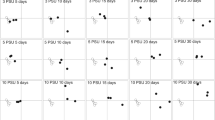Abstract
Flooding and salinity stress are predicted to increase in coastal Louisiana as relative sea level rise (RSLR) continues in the Gulf of Mexico region. Although wetland plant species are adapted to these stressors, questions persist as to how marshes may respond to changed abiotic variables caused by RSLR, and how herbivory by native and non-native mammals may affect this response. The effects of altered flooding and salinity on coastal marsh communities were examined in two field experiments that simultaneously manipulated herbivore pressure. Marsh sods subjected to increased or decreased flooding (by lowering or raising sods, respectively), and increased or decreased salinity (by reciprocally transplanting sods between a brackish and fresh marsh), were monitored inside and outside mammalian herbivore exclosures for three growing seasons. Increased flooding stress reduced species numbers and biomass; alleviating flooding stress did not significantly alter species numbers while community biomass increased. Increased salinity reduced species numbers and biomass, more so if herbivores were present. Decreasing salinity had an unexpected effect: herbivores selectively consumed plants transplanted from the higher-salinity site. In plots protected from herbivory, decreased salinity had little effect on species numbers or biomass, but community composition changed. Overall, herbivore pressure further reduced species richness and biomass under conditions of increased flooding and increased salinity, supporting other findings that coastal marsh species can tolerate increasingly stressful conditions unless another factor, e.g., herbivory, is also present. Also, species dropped out of more stressful treatments much faster than they were added when stresses were alleviated, likely due to restrictions on dispersal. The rate at which plant communities will shift as a result of changed abiotic variables will determine if marshes remain viable when subjected to RSLR.
Similar content being viewed by others
Author information
Authors and Affiliations
Additional information
Received: 8 April 1998 / Accepted: 15 June 1998
Rights and permissions
About this article
Cite this article
Gough, L., Grace, J. Effects of flooding, salinity and herbivory on coastal plant communities, Louisiana, United States. Oecologia 117, 527–535 (1998). https://doi.org/10.1007/s004420050689
Issue Date:
DOI: https://doi.org/10.1007/s004420050689




